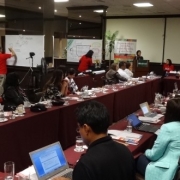Why is it urgent for Argentina to ratify the Framework Convention for Tobacco Control?
Last Tuesday, May 2, the National Executive Power submitted to the Chamber of Deputies a bill for the ratification of the Framework Agreement for Tobacco Control. Argentina is the only country in South America that has not yet done so and its ratification constitutes a pending debt for public health. In this note we tell you why the Argentine State should not miss this opportunity and why it is important to take this step for the adequate protection of the right to health.
“Below, we offer a google translate version of the original article in Spanish. This translation may not be accurate but serves as a general presentation of the article. For more accurate information, please switch to the Spanish version of the website. In addition, feel free to directly contact in English the person mentioned at the bottom of this article with regards to this topic”.
The National Ministry of Health, in the latest World Youth Tobacco Survey, revealed that our country has one of the highest tobacco addiction prevalence rates in the region. The data show that tobacco consumption causes 44,851 deaths per year, representing 13% of the total deaths and that more than 22% of the population still consumes tobacco, with the age at which smoking begins being increasingly lower, which is already ranges from 12 to 15 years.
Likewise, according to a study published by the Institute of Effectiveness and Health Clinic, our country spends approximately 197,000 million pesos each year to treat diseases caused by smoking (such as chronic obstructive pulmonary disease, heart disease, lung cancer, among others), representing 7.6% of local health spending. In addition, as if this were not enough, smoking mainly affects vulnerable social groups, thus generating a vicious circle of poverty and disease, and has been internationally recognized as a barrier to sustainable development.
It is this context that determines the urgency of moving forward with the ratification of the Framework Convention for Tobacco Control (FCTC). This is the first international public health treaty signed by the World Health Organization (WHO), which to date has been ratified by 182 countries (including all the States that are part of Mercosur, except Argentina) and is one of the the most widely accepted pacts in the history of the United Nations.
It is important to highlight that this treaty was prepared in order to respond to the global tobacco epidemic. To this end, the FCTC provides a comprehensive framework for the implementation of effective tobacco control policies aimed at reducing the supply, demand, and harm caused by these products. Thus, by ratifying this Agreement, Argentina would commit to adopting a battery of measures that would strengthen the public health protection standard.
Key points of ratification
Currently, our country has various regulatory provisions on tobacco control and some of them even adopt the measures provided for in the FCTC itself. However, it is important to highlight that the incorporation of this international instrument into the national legal system continues to be essential. Well, there are regulations that are still highly permissive to the commercial interests of the industry, while there are certain global problems that necessarily require international cooperation to address them.
In this sense, the adoption of the Framework Convention would improve the broad prohibition of advertising, promotion and sponsorship of tobacco products, including that with cross-border effects. This measure acquires fundamental importance in the face of the globalization of communications and the millionaire investments in marketing made by the industry. While the National Tobacco Control Law allows the presence of marketing within the points of sale, direct communications to people over 18 years of age, as well as corporate social responsibility actions by tobacco companies.
Likewise, the ratification of the Framework Convention would allow Argentina to have better tools to face the problem of illicit trade, such as the Protocol for the elimination of illicit trade in tobacco products, also signed under the auspices of the WHO. According to research, illicit trade – involving smuggling, counterfeiting, illicit manufacturing, among other forms – increases the accessibility and affordability of tobacco products, and violates price-related measures and targeted tax measures. to reduce the tobacco epidemic. This treaty recognizes that the elimination of all forms of illicit trade is an essential component of tobacco control and that it requires the development and application of both national and international measures. Within the scope of Mercosur, Argentina is the only country that does not participate in the negotiations for the control of smuggling, being left out of the decisions aimed at preventing illegal trade between neighboring countries.
In turn, the Framework Agreement, through its article 5.3 and the guidelines for its application, confer a set of measures aimed at protecting public health policies against commercial interests and other vested interests on the part of tobacco companies, as well as of individuals or organizations working to advance the interests of this industry. In this sense, the need to establish measures to limit interactions with the tobacco industry to those cases in which it is strictly necessary to establish an effective regulation of it and its products is highlighted; guarantee the transparency of the interactions that take place either through hearings and public records; require that the information provided by the industry be accurate and transparent; establish clear rules on conflicts of interest for all persons working in the State and in the sphere of tobacco control; denormalize and not approve, support, associate or participate in the activities that the tobacco industry promotes as “socially responsible” (such as public education initiatives, health care, etc.), among other recommendations. In this way, the FCTC provides an adequate legal framework to curb tobacco industry interference in public health issues related to tobacco control.
Finally, it is important to highlight that the ratification of the Framework Agreement would also enable the Argentine State to participate in spaces where relevant decisions are made for tobacco control and the construction of international cooperation strategies. An example of this is the Conference of the Parties, the governing body of the FCTC that is in charge of regularly reviewing its application and adopting the necessary decisions to promote its effective implementation. In addition, it is a body from which mechanisms are promoted for the transfer of specialized technical, scientific, technological and legal knowledge, taking into account the needs of the States Parties, if they are developing countries, if they have economies in transition, etc.
A matter of human rights
From the preamble, the Convention makes it clear that it is an international instrument “based on scientific evidence that reaffirms the right of all people to enjoy the highest level of health that can be achieved.” In this way, it exposes the relationship between the protection of the right to health and tobacco control policies.
In this regard, it is important to highlight that the ratification of the Framework Agreement is in line with the obligations assumed by the Argentine State in terms of protection of human rights. According to the International Covenant on Economic, Social and Cultural Rights -which also has a constitutional hierarchy- the Argentine State has the duty to adopt the necessary measures in order to guarantee the right of every person to enjoy the highest possible level of health. In this regard, the Committee on Economic, Social and Cultural Rights, through its observations, has said that the State’s failure to comply with the necessary measures to make it effective constitutes a violation of the right to health, as it would be the failure to adopt sufficient control policies for the marketing of tobacco products. Likewise, this Committee has specially recommended the Argentine State to ratify the FCTC and promote public policies aimed at preventing the initiation of consumption and informing about the negative impacts of tobacco on health, with emphasis on childhood and adolescence.
In the same sense, there is the Convention for the Elimination of all forms of Discrimination against women -which also enjoys constitutional hierarchy- and according to which the Argentine State, being a Party, has the duty to adopt the appropriate measures to protect and guarantee women’s right to health. In this regard, the Committee of this Convention has recommended that the Argentine State ratify the FCTC, reduce the high level of tobacco use among adolescents, particularly girls, and face the health consequences of smoking.
In this way, the intimate connection between tobacco control policies and human rights obligations is observed, even reinforced by the interpretive work of human rights monitoring organizations. Thus, the FCTC is used as a standard to understand the scope of the obligations derived from the human right to health, especially in the face of the tobacco epidemic.
What is the procedure for ratification of the FCTC to take place?
On September 25, 2003, the Argentine State through the National Executive Branch signed the FCTC. This is the first step to take in the process of ratifying an international treaty and implies the assumption of the commitment not to undermine the objectives of the treaty. Unfortunately, 20 years had to elapse since that signature was produced for the National Executive to finally present a bill for ratification before the National Congress.
This bill must be approved by both chambers so that once it has become law, the National Executive proceeds to the ratification -properly speaking- and the consequent deposit of the instrument before the United Nations. It is important to note that this action indicates the consent of a State to be bound by the terms of a treaty. Therefore, in case of non-compliance, there is the possibility of demanding compliance, both nationally and internationally.
What first our right to health!
The FCTC provides a legal framework with concrete measures aimed at preventing and limiting the tobacco epidemic. From the ratification, the Argentine state will be obliged to implement the measures that the Framework Agreement imposes, thus strengthening the protection standards that currently prevail in terms of tobacco control.
Public policies aimed at improving the health of the population require the greatest commitment on the part of all social actors and political forces. Today, Argentina has a new opportunity to settle this outstanding debt with public health, prioritizing the protection of fundamental rights -especially those who are in a situation of vulnerability, such as children and adolescents- over those negotiated. and industry business interests. The ratification of the FCTC must be high on the political agenda. The Chamber of Deputies has to move forward!
More Information
- An industry that does not give up
- Civil society organizations call for public policies free from interference from the tobacco industry
- Industry interference in the regulation of tobacco and nicotine products
Author
Maga Merlo
Contact
Maga Merlo, magamerlov@fundeps.org









